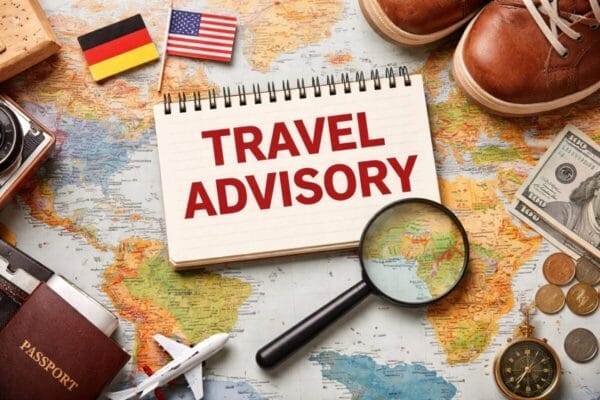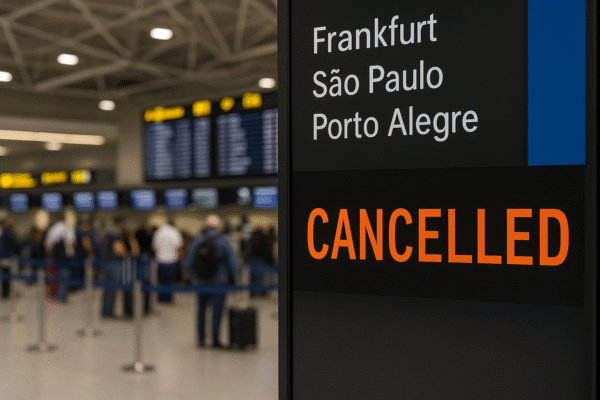Airports worldwide faced mounting disruptions on September 15, 2025, as over forty flights operated by easyJet, Swiss International Air Lines, and Delta Air Lines were canceled or severely delayed. Passengers were left stranded in key hubs across Europe and the United States, sparking widespread frustration during one of the busiest periods for international travel.
For the global tourism sector, already navigating a complex recovery, these cancellations pose serious challenges. Tourism economies rely heavily on dependable flight schedules to sustain hotel bookings, tours, and cultural events. A single wave of cancellations can create rippling effects across entire regions, affecting not only passengers but also businesses that depend on visitor spending.
easyJet Cancellations Create Bottlenecks Across Europe
Low-cost carrier easyJet, a vital airline for travelers across Europe, reported multiple cancellations and delays. Flights connecting Porto, Geneva, Basel, and Bordeaux were among those most affected, leaving hundreds of passengers scrambling for alternatives.
The cancellations were largely attributed to aircraft availability and air traffic control issues. For travelers heading to leisure destinations in France, Spain, and Switzerland, these setbacks disrupted carefully planned itineraries. Many tourists found themselves unable to connect with pre-booked hotels, excursions, and events.
Europe’s tourism-dependent cities, such as Barcelona and Bordeaux, rely heavily on airlines like easyJet to deliver a steady stream of international visitors. With cancellations mounting, local businesses—from boutique hotels to family-owned restaurants—are bracing for losses.
Swiss International Air Lines Cancels Transatlantic and Regional Routes
Swiss International Air Lines announced the cancellation of multiple flights, including Geneva to London Heathrow and Zurich to Boston. These disruptions impacted both European city-hoppers and transatlantic travelers heading to and from the United States.
For Swiss tourism, these cancellations could not come at a worse time. Switzerland’s peak travel season brings thousands of international visitors drawn by alpine resorts, cultural festivals, and lakefront destinations. Canceled connections risk discouraging long-haul travelers from making future bookings, dampening Switzerland’s competitiveness as a global tourism hub.
The Zurich to Boston route, in particular, highlights how long-haul flight cancellations can affect two tourism economies simultaneously. U.S. travelers en route to Switzerland for leisure or business, as well as Europeans traveling to New England, are equally disrupted.
Delta Air Lines Cancels Multiple Domestic U.S. Flights
In the United States, Delta Air Lines announced cancellations across several major hubs, including Atlanta, Detroit, Minneapolis, and New York. While some of the affected flights were short-haul domestic services, their cancellation caused significant knock-on effects.
For American travelers, domestic flight disruptions delay connections to international routes. For instance, passengers traveling from smaller cities to Atlanta or Detroit to board long-haul flights may have missed entire vacations abroad due to canceled feeder flights.
These operational setbacks illustrate how cancellations on domestic routes can extend globally, indirectly impacting international travel and the tourism industries of multiple destinations.
Broader Implications for the Tourism Industry
The tourism industry is one of the most sensitive to air travel disruptions. When flights are canceled, passengers may lose confidence in air carriers and re-think future travel plans. Tourism boards worldwide invest heavily in promoting their destinations, but unpredictable flight schedules undermine these efforts.
Key impacts include:
- Financial Losses: Hotels, restaurants, and tour operators see reduced bookings.
- Event Disruptions: Cultural festivals, business conferences, and sporting events suffer lower attendance.
- Passenger Trust: Frequent cancellations damage airline reputations, making tourists hesitant to book with carriers that appear unreliable.
Destinations like Paris, London, Zurich, and Barcelona, which rely on high volumes of international arrivals, face immediate consequences when flights are canceled. Each cancellation translates to lost revenue across multiple sectors of the local economy.
How Airlines and Tourism Can Respond
To minimize the damage, airlines and tourism operators must work collaboratively. Airlines can help restore confidence by offering:
- Transparent communication with passengers during delays.
- Flexible rebooking options with minimal penalties.
- Compensation for missed connections or accommodations.
Meanwhile, the tourism industry can adapt by offering travelers more flexible cancellation policies and alternative packages to encourage re-bookings. Governments may also play a role by supporting tourism businesses during periods of heavy travel disruption.
A Silver Lining: Opportunities in Regional Tourism
While international travel continues to face disruptions, domestic and regional tourism may benefit. Travelers who cannot fly abroad due to cancellations often choose closer-to-home destinations. This shift creates opportunities for regional tourism boards to promote local attractions, cultural heritage, and eco-tourism.
Additionally, canceled flights highlight the importance of building resilient tourism strategies. Countries and cities that diversify their markets—balancing international tourism with strong domestic offerings—can better withstand shocks from airline disruptions.
Looking Ahead: A Need for Resilience
The cancellations from easyJet, Swiss International Air Lines, and Delta Air Lines serve as a reminder of how fragile global travel networks remain. With millions depending on smooth operations, every disruption is felt across borders and industries.
As tourism recovers, collaboration between airlines, governments, and local businesses will be key. By implementing traveler-friendly policies, strengthening regional tourism, and improving airline reliability, the industry can weather these challenges.
For now, the priority is clear: rebuilding passenger trust and ensuring that tourism continues to thrive despite the turbulence caused by flight cancellations.
For more travel news like this, keep reading Global Travel Wire


















